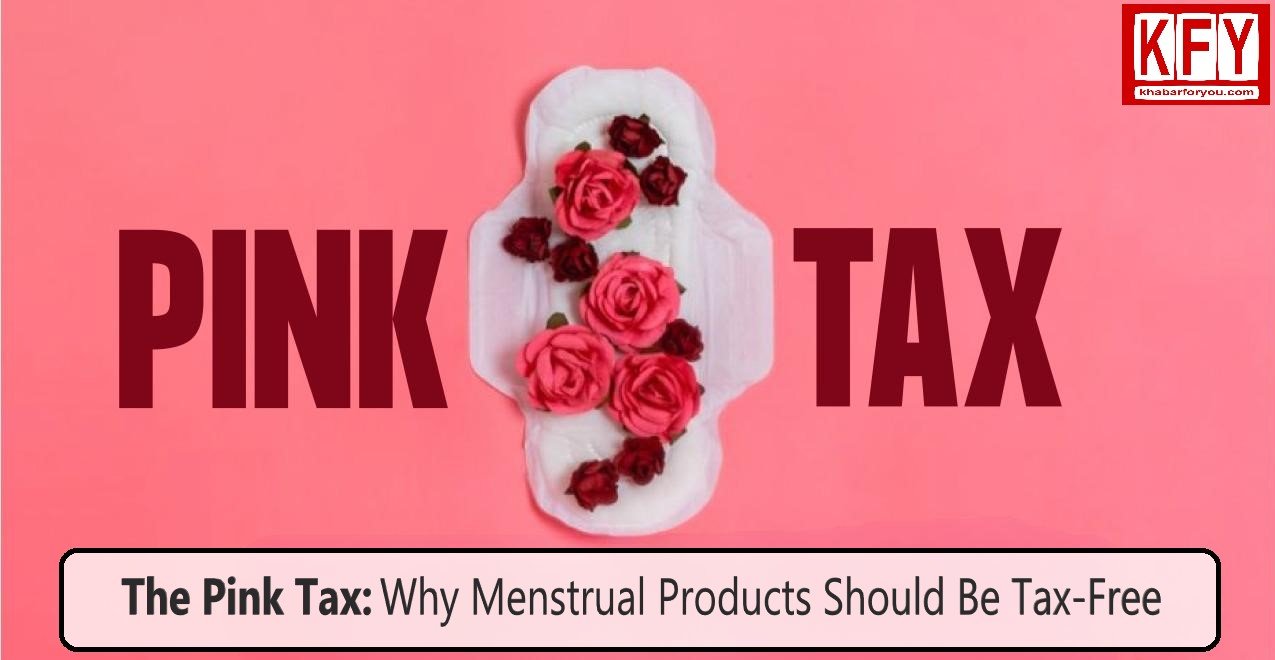The Pink Tax: Why Menstrual Products Should Be Tax-Free #PinkTax #Menstrual #women #girls #tampons #pads #MenstrualCups #hygiene #EndThePinkTax

- DIVYA MOHAN MEHRA
- 19 May, 2025
- 100115

Email:-DMM@khabarforyou.com
Instagram:-@thedivyamehra


For half the world's population, menstruation is a natural, recurring part of life. Yet for many women and girls, it comes with an additional—and often overlooked—financial burden: the pink tax. This term refers to the extra cost placed on products marketed toward women, especially essential items like tampons, pads, and menstrual cups, which in many regions are still taxed as luxury goods rather than necessities.
Read More - "अरे चाहि हि ए क्या औरत को?" — एक मीम, एक सवाल, और एक समाज की झलक
What is the Pink Tax?
The pink tax isn't an official tax, but a term used to describe how products for women often cost more than similar or identical products for men. This includes everything from razors and shampoo to, more seriously, menstrual hygiene products.
In many countries, menstrual products are subject to sales tax or value-added tax (VAT), even though they are essential to basic health and hygiene. Imagine taxing toilet paper or soap as a luxury—it's the same principle.
Why This Matters
For a woman who menstruates from the age of 13 to around 50, that’s roughly 456 periods in her lifetime. Add that up, and she’s spending thousands on menstrual products over the years. In places where these items are taxed, that cost becomes even more burdensome.
Now consider the impact on low-income women, students, or the homeless. For many, it’s a choice between buying food or buying pads. This isn't just an inconvenience—it's a public health issue. Lack of access to menstrual products can lead to infections, missed school or work, and emotional distress. It's called period poverty, and it's a global reality.
The Global Picture
Several countries have already recognized this injustice. Canada removed its tax on menstrual products in 2015. India followed in 2018. The UK eliminated the so-called "tampon tax" in 2021 after years of public pressure. Even some U.S. states like New York, California, and Illinois have passed laws exempting these products from tax.
But in many parts of the world—including much of Africa, Asia, and parts of Europe and the U.S.—the tax still exists, quietly affecting millions of lives every month.
The Argument Against the Tax
Taxing menstrual products suggests they are optional, or worse, a luxury—when they are clearly a necessity. No one chooses to menstruate. And yet, women are penalized for it financially.
The economic argument is simple: removing the tax won’t bankrupt governments. In fact, a 2020 study in the U.S. estimated that removing the tampon tax in all 50 states would cost just a fraction of most state budgets. But for the individual woman living paycheck to paycheck, that tax can be a monthly hardship.
Toward Period Equity
Making menstrual products tax-free is about more than money—it's about dignity and equality. Periods are not a choice. They are not a luxury. And the products required to manage them shouldn’t be treated as such.
Governments, policymakers, and citizens must recognize that menstrual health is not a niche issue—it’s a matter of human rights. Removing the pink tax is a small but powerful step toward a more equitable world.
Have thoughts on the pink tax or experiences with period poverty? Join the conversation using
#EndThePinkTax
Business, Sports, Lifestyle ,Politics ,Entertainment ,Technology ,National ,World ,Travel ,Editorial and Article में सबसे बड़ी समाचार कहानियों के शीर्ष पर बने रहने के लिए, हमारे subscriber-to-our-newsletter khabarforyou.com पर बॉटम लाइन पर साइन अप करें। |
| यदि आपके या आपके किसी जानने वाले के पास प्रकाशित करने के लिए कोई समाचार है, तो इस हेल्पलाइन पर कॉल करें या व्हाट्सअप करें: 8502024040 |
#KFY #KFYNEWS #KHABARFORYOU #WORLDNEWS
नवीनतम PODCAST सुनें, केवल The FM Yours पर
Click for more trending Khabar


Leave a Reply
Your email address will not be published. Required fields are marked *
Search
Category







